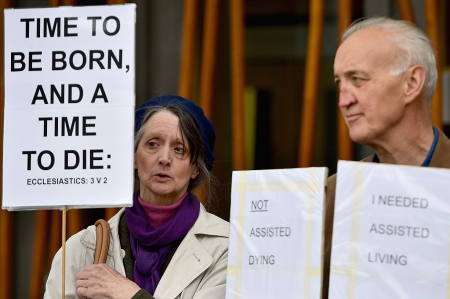Canada denies home healthcare to ALS patient, pays for assisted suicide instead

The family of a Canadian man says the government-run healthcare system failed their son who felt his only option was to die by physician-assisted suicide after his requests for home healthcare were denied.
Forty-one-year-old Sean Tagert died on Aug. 6 after Vancouver Coastal Health, a publicly-funded healthcare provider in British Columbia, refused to cover the 24-hour in-home healthcare his doctor said he needed, the CBC reported earlier this month. The provider said it would cover 15 to 20 hours a day for care, but Tagert would be required to pay for the remaining hours at a cost of $7,905 a month, which he could not afford.
Tagert, who was diagnosed with ALS in March 2013 at age 36, had already wiped out his savings to pay for modifications to his home to accommodate a power wheelchair and a mechanical sling to help him get in and out of the shower. He also had an EyeWriter that enabled him to communicate with his family and caregivers.
While Vancouver Coastal Health — one of six healthcare providers managed by the provincial government of British Columbia that regulates spending based on criteria set by the federal government — refused to fully pay for Tagert's 24-hour care, it did offer to cover his relocation to the George Pearson Centre, a residential living facility in Vancouver, nearly five hours away from his home in Powell River. Tagert declined, however, because it would've required him to be separated from his 11-year-old son, whom he shared custody with his ex-wife, and credited for helping him to keep living.
Tagert had also expressed concerns that the facility being offered to him was not equipped to care for patients with ALS who are on a ventilator, unable to move their bodies, and require daily tracheostomy care, including suctioning fluid from the lungs.
In an interview with the CBC last year, Tagert's physician, Dr. Stephen Burns, said his medical setup at home was "second to none."
Burns also said Tagert had developed a communication system with his nurses and therapists who were used to providing his in-home care on a routine basis. The doctor further explained that the same quality of care could not be replicated at a large residential facility that does not offer one-on-one hourly care and has a "constantly changing staff."
"People need to be cared for like human beings, at home … they should not be warehoused away in facilities," Tagert's mother, Trish Mennitti, told the CBC last year.
In a lengthy Facebook post published on Tagert's page on Aug. 7, the day after he died by physician-assisted suicide, his friends and family pleaded with the government to "recognize the serious problems in its treatment of ALS patients and their families, and find real solutions for those already suffering unimaginably."
They added: "Ensuring consistent care was a constant struggle and source of stress for Sean as a patient. While he succeeded, with the help of many, in piecing together a suitable care facility in his own home ... gaining the 24-hour care he required was extremely difficult, especially as the provincial government refused to fully fund home care."
“When you deny the necessary care, sometimes a person, out of despair, will ask for euthanasia,” said Alex Schadenberg, executive director of the Euthanasia Prevention Coalition, in an interview with LifeSiteNews. “I predicted this would happen, and sadly, it is now a reality.”
In an opinion piece published in the National Review, Wesley Smith, a senior fellow at the Discovery Institute’s Center on Human Exceptionalism, said euthanasia regimes are never about having the option to die, as it is often presented.
“A Canadian man disabled by ALS didn’t want to die now. He wanted to be cared for at home so he could be with his son,” Smith said.
“Nope. The government’s socialized health-care system refused to pay for all the care he needed. But it sure paid to kill him by euthanasia."
Euthanasia and assisted suicide have become increasingly embraced in Canada and has been advertised in hospital waiting rooms, as The Christian Post reported in November 2018.
"MAiD is a medical service in Canada, whereby physicians and nurse practitioners help eligible patients fulfill their wish to end their suffering," one such ad reads.
MAiD is short for the euphemism "medical aid in dying."
Melissa Barnhart contributed to this article.





















